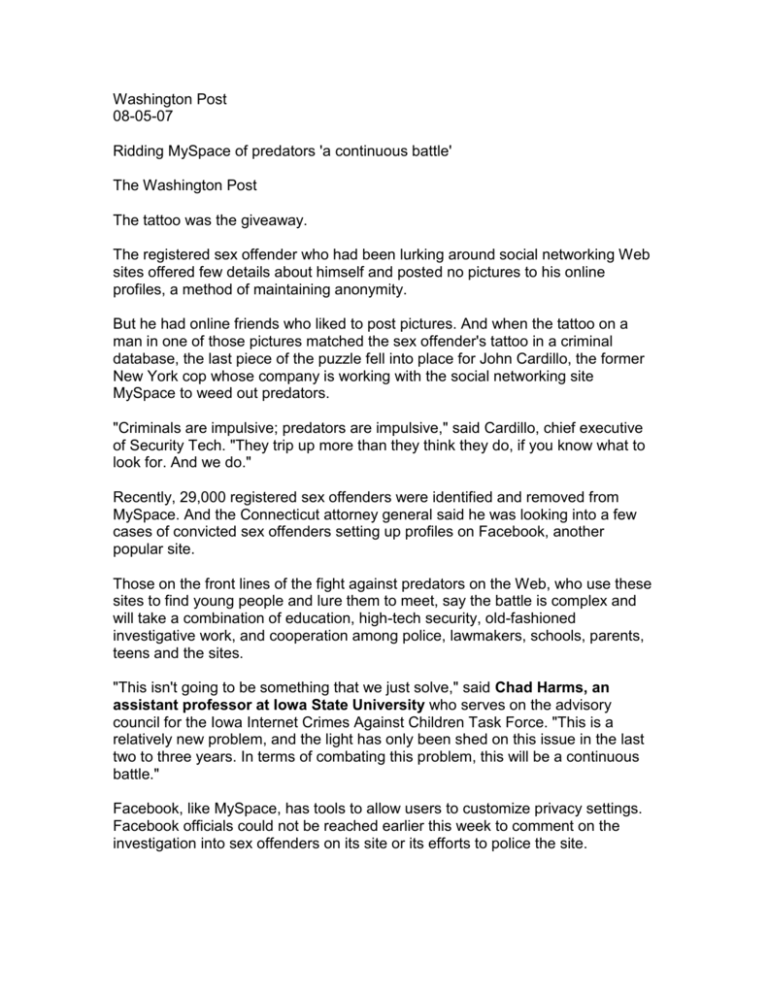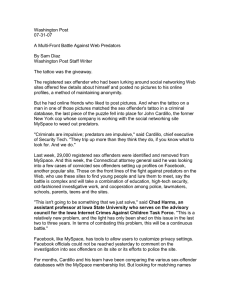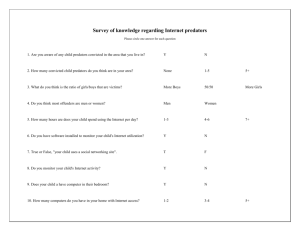
Washington Post
08-05-07
Ridding MySpace of predators 'a continuous battle'
The Washington Post
The tattoo was the giveaway.
The registered sex offender who had been lurking around social networking Web
sites offered few details about himself and posted no pictures to his online
profiles, a method of maintaining anonymity.
But he had online friends who liked to post pictures. And when the tattoo on a
man in one of those pictures matched the sex offender's tattoo in a criminal
database, the last piece of the puzzle fell into place for John Cardillo, the former
New York cop whose company is working with the social networking site
MySpace to weed out predators.
"Criminals are impulsive; predators are impulsive," said Cardillo, chief executive
of Security Tech. "They trip up more than they think they do, if you know what to
look for. And we do."
Recently, 29,000 registered sex offenders were identified and removed from
MySpace. And the Connecticut attorney general said he was looking into a few
cases of convicted sex offenders setting up profiles on Facebook, another
popular site.
Those on the front lines of the fight against predators on the Web, who use these
sites to find young people and lure them to meet, say the battle is complex and
will take a combination of education, high-tech security, old-fashioned
investigative work, and cooperation among police, lawmakers, schools, parents,
teens and the sites.
"This isn't going to be something that we just solve," said Chad Harms, an
assistant professor at Iowa State University who serves on the advisory
council for the Iowa Internet Crimes Against Children Task Force. "This is a
relatively new problem, and the light has only been shed on this issue in the last
two to three years. In terms of combating this problem, this will be a continuous
battle."
Facebook, like MySpace, has tools to allow users to customize privacy settings.
Facebook officials could not be reached earlier this week to comment on the
investigation into sex offenders on its site or its efforts to police the site.
For months, Cardillo and his team have been comparing the various sex-offender
databases with the MySpace membership list. But looking for matching names
and addresses is only a small part of the work. He is also looking for missteps
that might reveal more information about the criminals.
The Washington Post
The tattoo was the giveaway.
The registered sex offender who had been lurking around social networking Web
sites offered few details about himself and posted no pictures to his online
profiles, a method of maintaining anonymity.
But he had online friends who liked to post pictures. And when the tattoo on a
man in one of those pictures matched the sex offender's tattoo in a criminal
database, the last piece of the puzzle fell into place for John Cardillo, the former
New York cop whose company is working with the social networking site
MySpace to weed out predators.
"Criminals are impulsive; predators are impulsive," said Cardillo, chief executive
of Security Tech. "They trip up more than they think they do, if you know what to
look for. And we do."
Recently, 29,000 registered sex offenders were identified and removed from
MySpace. And the Connecticut attorney general said he was looking into a few
cases of convicted sex offenders setting up profiles on Facebook, another
popular site.
Those on the front lines of the fight against predators on the Web, who use these
sites to find young people and lure them to meet, say the battle is complex and
will take a combination of education, high-tech security, old-fashioned
investigative work, and cooperation among police, lawmakers, schools, parents,
teens and the sites.
"This isn't going to be something that we just solve," said Chad Harms, an
assistant professor at Iowa State University who serves on the advisory
council for the Iowa Internet Crimes Against Children Task Force. "This is a
relatively new problem, and the light has only been shed on this issue in the last
two to three years. In terms of combating this problem, this will be a continuous
battle."
Facebook, like MySpace, has tools to allow users to customize privacy settings.
Facebook officials could not be reached earlier this week to comment on the
investigation into sex offenders on its site or its efforts to police the site.
For months, Cardillo and his team have been comparing the various sex-offender
databases with the MySpace membership list. But looking for matching names
and addresses is only a small part of the work. He is also looking for missteps
that might reveal more information about the criminals.












